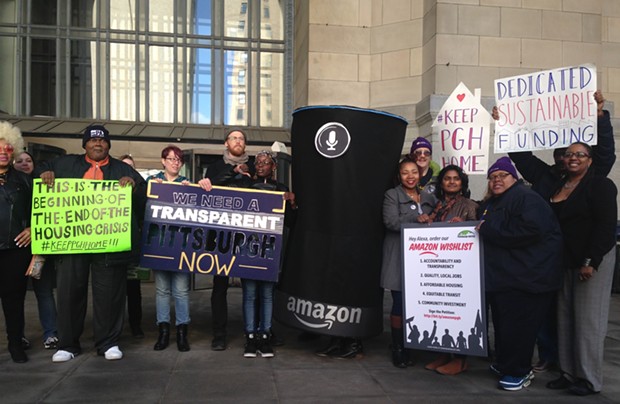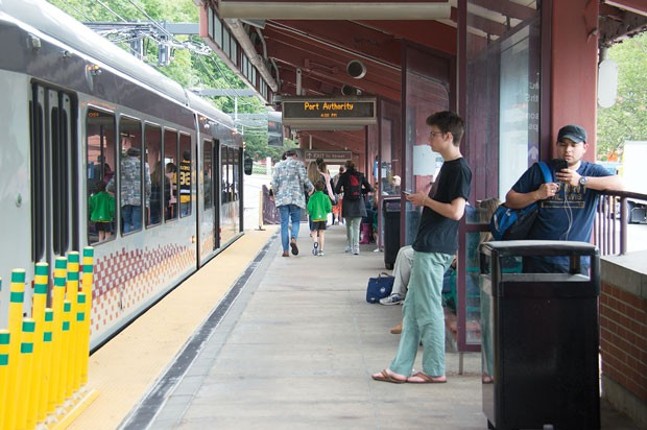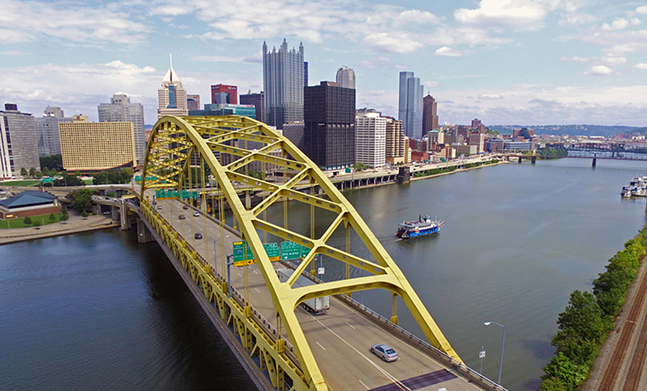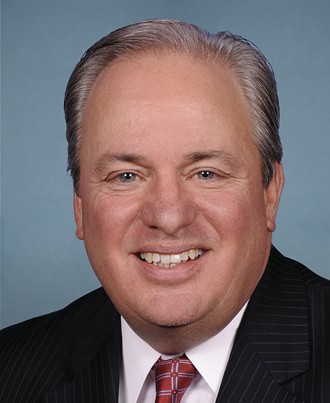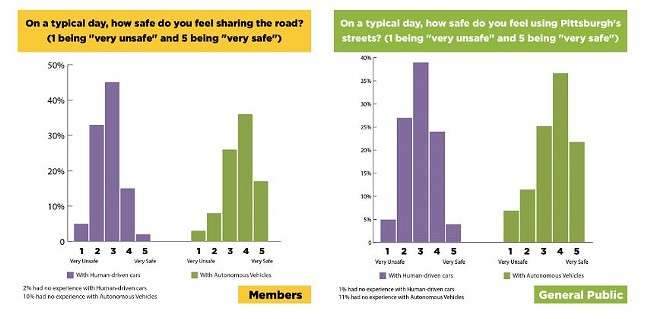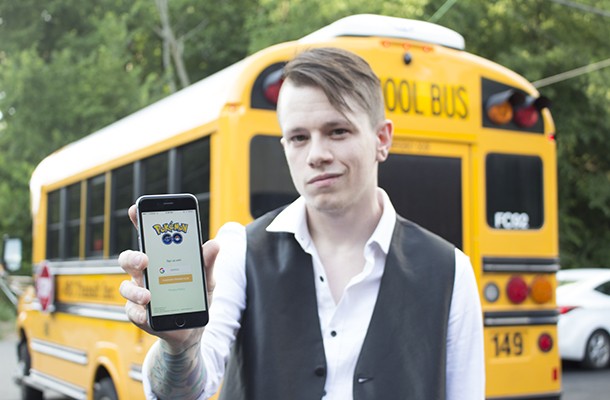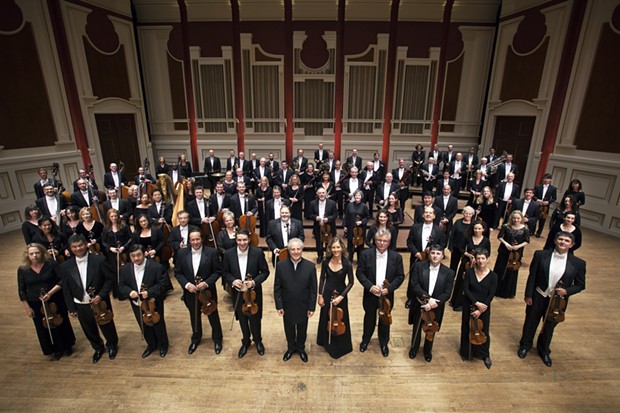Wednesday, May 23, 2018
Peduto has voiced much more criticism of Uber in the years since, and Uber has faced a series of issues unrelated to their relationship with Pittsburgh.
The latest issue involves Pittsburgh, though.
Uber announced May 23 the termination of its autonomous-vehicle testing in Arizona. An Uber driverless-car collided fatally with a pedestrian in Tempe in March, and Gov. Doug Ducey suspended autonomous-vehicle testing in that state. Since, Uber has suspended all autonomous testing.
The suspension includes Pittsburgh, but Uber stated in a news release that it's eyeing a return to Pittsburgh streets.
Tags: Pittsburgh , Uber , Bill Peduto , autonomous vehicles , PennDOT , safety , crash , Arizona , Doug Ducey , Image
Wednesday, April 11, 2018
Earlier today, a group of about 15 Pittsburgh residents and housing and transit advocates held a press conference at the City-County Building Downtown. They called on city officials to take steps to ensure the Seattle dynamic doesn't play out in Pittsburgh, if the city were to land Amazon’s second headquarters.
A sign at the press conference read out five goals advocates wanted to see advanced: Accountability and transparency, quality local jobs, affordable housing, equitable transit, and community investment.
Tags: Pittsburgh , Bill Peduto , Amazon , Geekwire , Hazelwood , Pittsburgh United. affordable housing , inequality , Brandi Fisher , Image
Thursday, December 14, 2017
The FCC is proposing axing the rules, and FCC chair Ajit Pai announced a vote will take place today, Dec. 14. Republicans like Pai claim that current net-neutrality rules, which bar internet service providers from slowing down or favoring certain web content, are an overly burdensome regulation on the internet that has hurt investment.
But Democrats, like Doyle, believe that repealing the rules will hurt consumers.
Tags: Mike Doyle , Pittsburgh , Federal Communications Commission , net neutrality , Ajit Pai , internet providers , Republicans , Democrats , PolitiCrap , Image
Wednesday, November 1, 2017
But now, that same technology, through Port Authority’s TrueTime tracker, is being applied to the light-rail lines. The lines, commonly referred to as the “T," run from the North Side through Downtown and into the South Hills. Both red and blue lines will be tracked with the real-time technology.
Tags: Port Authority of Allegheny County , TrueTime , Rich Fitzgerald , David Donahue , light-rail , bus , Image
Friday, September 8, 2017
But economic factors and development realities in Pittsburgh indicate the region is far from Amazon’s sweet spot. Amazon’s list of preferences is intimidating. The tech company is first looking for a 500,000-square foot existing building that is close to a population center of more than 1 million people and near major highways. This will already be hard to find in Pittsburgh, as the city’s biggest building, the U.S. Steel Tower, only currently has about 300,000 square feet available.
With Amazon’s most preferred option most likely off the list, the second option would be a 100-acre pad-ready development site. Pittsburgh is filled with brownfields, old industrial sites the require clean up, and pad-ready sites are hard to come by. Especially ones that are “close to major arterial roads to provide optimal access,” as Amazon is demanding. Some have indicated the old Civic Arena site as a possibility, but that site is only 28 acres.
Additionally, the 500,000-square-foot site would just be the first part of Amazon’s development. Eventually, the company is looking to build a headquarters similar to its 8-million-square-foot Seattle headquarters.
The larger Almono site in Hazelwood has also been floated around as an option, but this site, while already in redevelopment, comes up short in Amazon’s requirement of having “direct access to rail, train, subway/metro, bus routes.” Currently, the Almono site does not connect to light-rail or even to one of the city’s three busways. Only three buses serve part or all of Almono — the 56, 57 and 58 — and they only arrive about every 20-30 minutes; hardly a vibrant public-transit hub. Not to mention the vision of Almono site is to house multiple companies, not one large one.
Chris Briem, an economist at University of Pittsburgh’s Center for Social and Urban Research, says this is out of scope for the Pittsburgh area. “Is there is site for them?” asks Briem. “Eight million square feet, I mean, that is like three U.S. Steel Towers. … Space has always been a terrible challenge for Pittsburgh.”
Besides the lack space available, Amazon is also looking for an extensive incentive package of tax-breaks, relocation grants, fee reductions and site preparation. Pittsburgh and Allegheny County can only offer limited incentives, like Tax Increment Financing and Local Economic Revitalization Tax Act District distinction, which provide city and county tax breaks for a few years.
However, most regions can offer these, so Briem says further incentives will have to come from the state. Briem adds it will be difficult to convince the state to allocate money for incentives when it is currently struggling to pass a budget. Also, Briem points out that Pennsylvania has a history of offering large state subsidies to companies and getting burned.
Pennsylvania gave $70 million in incentives to Volkswagen to build a plant in Westmoreland County. It opened in 1978 and by 1988, it was closed. But, Pittsburgh does have advantages other places can’t offer. The region has some of the lowest housing costs in the country, and Pittsburgh is emerging as a world leader in robotics and artificial-intelligent technologies.
However, Pittsburgh probably doesn't have a large enough workforce, filled with highly-educated workers, to satisfy Amazon. The company is requesting filling an estimated 50,000 positions. Bloomberg columnist Conor Sen paints grim prospects for Pittsburgh. “Consider a place like Pittsburgh,” Sen wrote in a Sept. 7 Bloomberg article. “Its metro area is 2.35 million people, and its labor force is 1.2 million. But the size of its labor force hasn't grown in 25 years. Even with the talent [Pittsburgh’s] well-respected universities produce, [why] is Amazon, a company that thinks of growth in terms of decades, going to locate a headquarters in a place where it might have to hire over 4 percent of the metro area's labor force with uncertainty over whether that labor force will ever grow?”
And, unfortunately, the final nail in Pittsburgh’s Amazon coffin might be the Pittsburgh International Airport. The airport still lacks the international access that a hub like Atlanta, Chicago and even Philadelphia can offer. It also lacks a direct flight to Seattle, home of Amazon.
Well-known urban planning expert Richard Florida corresponded with Pittsburgh City Paper via Twitter about Pittsburgh's chances at getting Amazon. Florida, a former Carnegie Mellon University professor and Pittsburgh fanboy, indicated our airport may not be up to task.
“I adore Pittsburgh, but I put it more of a sleeper category along with, say, Nashville,” wrote Florida in a tweet to CP. “Great assets but lacking in global airport access.”
Politicians like Peduto and Fitzgerald shouldn’t be faulted for trying, as Amazon moving to Pittsburgh would be a game-changer and would potentially turn around Pittsburgh’s shrinking population problem. And Florida hinted in a tweet that Amazon should consider cities that might struggle to offer incentives like Pittsburgh or Detroit, because of the good the company could do.
“On the Amazon HQII decision: they should take the highroad, turn down any form of incentives & create a model of inclusive prosperity,” tweeted Florida on Sept. 7.
But in a world where large companies like Amazon control so much influence, Florida indicated that those companies are likely to pass over Pittsburgh for cities that makes more sense economically, and those tend to be regions that are already thriving.
“Exactly right. [Amazon] will go to established places that are already talent magnets,” tweeted Florida on Sept. 7. “The world is getting spikier.”
Tags: Pittsburgh , Allegheny County , Bill Peduto , Rich Fitzgeral , Chris Briem , Conor Sen , Bloomberg , Amazon , Rich Florida , Seattle , Atlanta , Philadelphia , Pittsburgh International Airport , Almono , U.S. Steel Tower , Image
Tuesday, August 8, 2017
But on Aug. 2, President Donald Trump held a press conference where he gave support to the Reforming American Immigration for Strong Employment (RAISE) Act, which seeks to cut legal immigration up to 50 percent and give priorities to English-speaking immigrants, among other reforms. The bill was introduced by co-sponsors U.S. senators Tom Cotton (R-Arkansas) and David Perdue (R-Georgia).
U.S. Rep. Mike Doyle (D-Forest Hills), whose district encompasses Pittsburgh, McKeesport and New Kensington, says this bill goes against what Pittsburgh and the region are trying to accomplish. He says he wants people to move here, regardless of what country they were born in.
Tags: Mike Doyle , Donald Trump , RAISE Act , Tom Cotton , David Perdue , Lindsey Graham , Ron Johnson , Marco Rubio , Pittsburgh , Allegheny County , University of Pittsburgh , PolitiCrap , Image
Tuesday, April 4, 2017
Internet users shouldn't freak out too much, though. No internet rules will change from how they currently operate. Despite sensational headlines circulating on the web, browsing histories can’t be purchased by individuals and then used for blackmail, etc. It's more likely that ISPs will continue to build huge data sets with users’ histories, and offer those data sets to advertisers for monetary reimbursement. But the roll-back of the rule does mean that internet users no longer have the option to surf the web without companies using their browsing history to sell them shit.
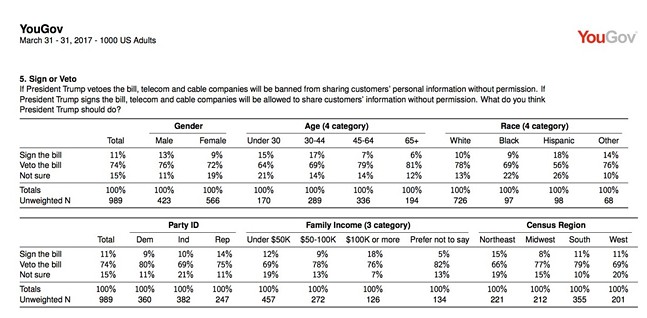
Companies like Google and Facebook have always — and would have continued to even under the now-axed rule — had the ability to mine users’ data to and sell it to advertisers. But for internet users who wished to avoid that, certain browsers, tools and programs offered more protection, by not saving cookies and discarding IP addresses. Now those options for the privacy-seeking users have been rolled back, since virtually everyone needs an ISP to access the internet.
Even though the ruling doesn’t change anything, the rollback of the Obama-era rule is still extremely unpopular. According to a YouGov poll taken on March 31, 74 percent of the Americans wanted Trump to veto the bill and only 11 percent wanted him to sign it. Even respondents who identified as Republicans hated the rollback. Only 14 percent of GOP respondents wanted the rule to go through and 75 percent wanted a veto.
SJ 34 passed by a 215-205 margin in the U.S. House and by a 50-48 margin in the U.S. Senate. That means if six reps in the House or two senators in the Senate had switched their votes, the bill would have died. Because the bill is so widely unpopular among the public, the Pennsylvania Democratic Party speculated that legislators who supported SJ 34 may have had some financial incentive to vote in favor, and published a list of the telecom industry’s contributions to their campaigns. However, Sen. Bob Casey, who voted against the change, also has received campaign money from telecom industry.
So who are those legislators that pushed through a very unpopular resolution? City Paper would love to write a list detailing all of the legislators in the House and Senate who voted for SJ 34, but that would be mind-numbingly long. Instead, CP provides a list of the Pennsylvania legislators in our coverage area and how they voted on the rollback of internet privacy.
Sen. Pat Toomey (R-Lehigh): YES
Toomey voted in favor of SJ 34 and his press secretary, Steve Kelly, in an email to CP, offered this explanation: “The actions taken by Congress do nothing to weaken longstanding federal and state privacy laws or investigatory powers. Rather, Congress rolled back a regulation passed by President Obama’s FCC in late 2016 which does not equally apply privacy rules across all online entities. Senator Toomey hopes that the FCC and the FTC will work together to develop uniform privacy requirements.”
Kelly also noted that the Federal Trade Commission and Federal Communications Commission still have the power to investigate unjust privacy practices, even though the Obama rule was rolled back.
Sen. Bob Casey (D-Scranton): NO
Casey voted against SJ 34 and sent this comment to CP by email: “Pennsylvanians have a reasonable expectation that their internet browsing history is private, which is why I voted against this resolution.”
U.S. Rep. Mike Doyle (D-Forest Hills): NO
I spoke against GOP bill to allow ISPs to collect and sell data about what you do online without your permission: https://t.co/3gzKGBskZy
— Mike Doyle (@USRepMikeDoyle) March 28, 2017
Doyle voted against SJ 34 and, on March 28, spoke in front of Congress in opposition before the bill came to a vote. "Today we are waiting waist deep in the swamp," said Doyle. "The American people did not ask for this resolution. In fact, no company will even put its name behind this effort. ... No consumer has made an argument that this even makes sense. I challenge every member of this body, at your next town-hall meeting to have a show of hands of how many people thinks it's a good idea to allow your internet-service provider to sell their personal information without their permission."
Doyle also started a petition asking Trump to veto the bill. However, the petition only garnered 3,650 signatures of its 100,000 goal.
U.S. Rep. Mike Kelly (R-Butler): YES
Kelly voted in favor of SJ 34 and his office didn’t return a request for comment on why he voted for the bill, nor has Kelly made any public statement. Somewhat ironically, Kelly participated in an event with Google on March 13 in Sharon, Pa. meant to teach kids how to protect their privacy while using the internet.
U.S. Rep. Keith Rothfus (R-Sewickley): YES
Rothfus voted in favor of SJ 34 and in fairly typical Rothfus fashion, didn’t return a request for comment on why he supported the bill, nor offered any public statement.
U.S. Rep. Tim Murphy (R-Upper St. Clair): YES
Murphy voted in favor of SJ 34 and his press secretary, Carly Atchison, directed CP to Murphy’s public newsletter which says: “Murphy strongly supports online privacy rules to protect sensitive personal and consumer digital information. The Congressman voted in favor of the Email Privacy Act (H.R. 387) which passed the House earlier this year and sets the highest standard for government access to private internet communications. The Email Privacy Act protects emails, data and digital communications by requiring authorities to obtain a search warrant before gaining access to any such forms of communication.”
The newsletter also states the “net effect” of the rollback is “zero” and “Congress’ decision to kill the FCC’s proposed rules will leave in place data collection and use policies exactly as they are.”
However, according the YouGov poll, Americans appeared to want Congress and President Trump to make internet privacy better, not just leave it the way it is.
Tags: Pat Toomey , Bob Casey , Mike Kelly , Keith Rothfus , Tim Murphy , Mike Doyle , SJ 34 , PolitiCrap , Image
Wednesday, March 22, 2017
Because of this unpredictability, it's not all that surprising that Pittsburgh cyclists would support taking the human element out of driving, and data recently released by Bike Pittsburgh proves it. The bike- and pedestrian-advocacy organization released a survey on March 21, showing that only about 10 percent of Bike Pittsburgh members with and without experience sharing the road with driverless cars disapprove of Pittsburgh as a testing-ground for autonomous vehicles. Moreover, about 75 percent of Bike Pittsburgh members actually approve or somewhat approve of driverless-car testing in Pittsburgh. (Somewhat ironically, a recent survey of Americans with AAA coverage showed that 75 percent of drivers were afraid of fully autonomous vehicles.)
In September 2016, Uber debuted its semi-autonomous vehicles in a highly publicized event. Since then, semi-autonomous Volvo SUVs and Ford sedans have been navigating select Pittsburgh neighborhoods, with a driver ready to take over and a technician monitoring the driverless components.
The survey compiled responses from 321 Bike Pittsburgh members and about 800 non-members. About 40 percent of members said they have interacted with a driverless car either on bike or on foot (non-members have interacted with AVs slightly less on bike, but slightly more on foot).
“While our own personal experiences riding and walking alongside AVs have been mostly positive, we believe that the introduction of these vehicles to our streets deserves a larger conversation,” said Eric Boerer, BikePGH Advocacy Director, in a press release. “As far as we know, we are the first organization collecting these stories from bicyclists and pedestrians.”
Both members and non-members also said they felt safer when interacting with an autonomous vehicle, rather than with a car controlled by a driver, even if there were still some uneasiness. "People noted the lack of road rage and aggression toward them as opposed to human drivers," said the study. "However, many were not comfortable with the dehumanization of the interaction even if it ended up being safe."
But not all reports were positive, according to the press release. While most bike-riding respondents noted driverless cars gave four feet while passing, several people cited times AVs passed them only giving a few inches. Additionally, some walking survey respondents noted driverless cars didn't stop for them while waiting to cross the street, and one respondent witnessed an AV running a red light. (It should be noted that Recode recently published a story showing that while Pittsburgh has become the epicenter of semi-autonomous vehicle testing in the U.S., the driverless cars only travel an average of 0.8 miles before human drivers have to intervene.)
Regardless, respondents of the survey want Bike Pittsburgh to support AVs; 50 percent of members and 43 percent of non-members want the bike-advocacy organization to "actively support" autonomous vehicles. Only 3 percent of members and 7 percent of non-members want them to oppose AVs.
Tags: Bike Pittsburgh , Uber , Pittsburgh , Image
Friday, July 15, 2016
When local Tom Larkin posted on Facebook early Monday saying he would drive people around so they could play Pokemon Go, he didn’t think anybody would take him up on the offer.
“I was more or less joking,” says Larkin. “I didn’t think anyone would hit me up, but they did.”
After his inbox was flooded with messages for rides, he said he had two options: flourish or flounder. In the past several days, Larkin’s Facebook post has turned from an idea into a functioning Pokemon Go ride-hailing service called VIPGo.
The service is part of a Pittsburgh-based ride-hailing application called RideVIP. Clients can open the RideVIP application and queue up a driver for a Pokemon Go outing.
Larkin's Internet virality skyrocketed when news aggregator NowThis posted a video about Larkin’s ride-hailing idea. It garnered more than 6 million views in a matter of three days on Facebook.
“Now everyone knows who I am,” says Larkin. “I get called the ‘Pokemon Guy’ at the gas station.”
Pokemon Go is Nintendo’s second first-party title to appear on a mobile platform in the last year. The game uses a smartphone’s GPS with predesignated, real-world locations known as “Pokestops” or gyms. Players are required to physically visit these places to catch Pokemon, progress and grow levels.
Thursday evening, Larkin and his team set off from RideVIP’s headquarters in the North Hills to Mount Washington to pick up Jess, Lucci and Antania Hawkins. Antania Hawkins suffers from Dravet syndrome, a rare form of epilepsy that subjects her to daily seizures, leaving her wheelchair-bound. Larkin took the family around Mount Washington to catch some Pokemon, free of charge.
“The thought came from the fact that this game is so awesome, and there’s people that can’t play it and that sucks,” says Larkin. “I wanted to solve that, and that’s just kind of how my mind works. When I see a problem, I try to think of the most inventive solution for it. With this — there was a story that just came out today saying that Pokemon Go sections off mobility-challenged people, or people that are unable to get out of the house. I just want to prove that it’s not. We offer an alternative or a way to get out and play the game.”
“The first time I did this, I thought my inbox went crazy,” Larkin continues. But now he’s receiving higher volumes of messages from mobility-challenged people hoping to ride with VIPGo to play some Pokemon.
He says he'll continue to offer the opportunity to play Pokemon Go to individuals with varying abilities.
Since everything is moving so quickly, logistics are still being ironed out on VIPGo’s end. But Larkin has experience working with startups and says he has assisted in starting over 60 companies. VIPGo has received $27,000 in investments in under a week.
VIPGo drivers will be given an itinerary listing “hot spots” where players have reported a high volume of Pokemon, as well as Pokestops and gym locations. They are required to be versed in the game, and for VIPGo driving trainee Matt Vaughan, that won’t be a problem.
“I was immediately texting Tom to see if and when this was going to start,” says Vaughan. “It’s a very intriguing situation that they’ve put themselves in. As a friend of theirs and as an Uber driver, I said, ‘You know what? I’m going to support this and try my best to keep things moving.’”
Larkin says he aims to make VIPGo available nationwide eventually.
“I have to stick with this for a while,” says Larkin. “I’m the face of this.”
Tags: Pokemon , Pokemon Go , ride hailing , ride sharing , Pittsburgh , Uber , Tom Larkin , Image
Friday, May 20, 2016
On Sunday, in the midst of a 14-date European tour, the Pittsburgh Symphony Orchestra will capitalize on today's advances in digital infrastructure with a live-streamed performance from Berlin, and their first ever public simulcast at Heinz Hall and online at pittsburghsymphony.org.
“[The Berlin Philharmonic has] an incredible technical set-up there which is equivalent to the Met broadcast from the Metropolitan Opera,” says Pittsburgh Symphony Orchestra President Melia Tourangeau. “So what we’re doing is basically taking advantage of that system and doing a live feed of the concert back to Heinz Hall in real time. It will be as if you’re sitting in Berlin watching the Pittsburgh Symphony.”
The concept for the Digital Music Hall, the Berlin Philharmonic’s in-house online concert streaming wing, started about 10 years ago. As music consumption shifted away from television, radio and CDs to the internet, the Berlin Philharmonic needed a new way to reach new audiences, even if the technology wasn’t quite there yet.
“At the beginning, HD streaming on the Internet was a tough challenge,” Tobias Möller, Director of Marketing and Communications at Berlin Phil Media, wrote in an email to City Paper. “But we are very happy that nowadays it has become very usual to enjoy audiovisual content online. However, you need to invest continuosly [sic] in all kinds of platforms because customers expect you to present your content on all media, from mobile devices to streaming devices and SmartTV.”
Digital streaming has become an integral tool for orchestras worldwide to reach new audiences as attendance and budgets have continued to shrink. The Detroit Symphony notably introduced their digital streaming capabilities in 2011, the first in the U.S. to do so. While the PSO hasn’t yet released their own digital streaming service — Berlin’s Digital Music Hall is a hired producer. Sunday’s performance will not stream on their channel — Sunday’s performance marks their first foray into live digital streaming from abroad.
Under Music Director Manfred Honeck, PSO’s Berlin performance will include pieces by Rachmaninoff, Tchaikovsky and Beethoven, with Russian pianist Daniil Trifonov. Back in Pittsburgh, the simulcast at Heinz Hall will be emceed by WQED’s Jim Cunningham.
“When I first came here, there were a lot of questions in the community of ‘what’s the value of international touring for this orchestra and what does it mean and why do we do it?’ And that type of thing. It’s an expensive venture,” says Tourangeau. “The purpose of this broadcast back to Heinz Hall is to say, ‘come and see what the world is actually seeing while we’re out and about.’”
Tags: Pittsburgh Symphony Orchestra , Simulcast , Stream , Berlin , Germany , Performance , Live , Image



